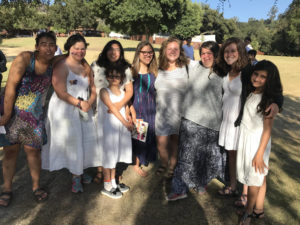 Tikvah is without a doubt the most special part of camp. Even as a camper, I knew I wanted some way to be a part of it. As a madrichah (counselor), I could not possibly have prepared for the most challenging and joy-filled summers of my life. I was a lucky witness to the intricate moments of each day with our chanichim (campers)– the dancing, laughing, inside jokes, singing, story-telling, and goofing off. I was even luckier to see my chanichim become friends with each other, as well as kids in other edot– braiding their hair and painting nails in the tent, swimming with them in the pool, giggling and sharing jokes. Nothing made me more proud than seeing those friendships blossom. In Amitzim, there’s so much pride in seemingly small moments, though after knowing my chanichim and watching them grow, I know those moments are not small in the least.
Tikvah is without a doubt the most special part of camp. Even as a camper, I knew I wanted some way to be a part of it. As a madrichah (counselor), I could not possibly have prepared for the most challenging and joy-filled summers of my life. I was a lucky witness to the intricate moments of each day with our chanichim (campers)– the dancing, laughing, inside jokes, singing, story-telling, and goofing off. I was even luckier to see my chanichim become friends with each other, as well as kids in other edot– braiding their hair and painting nails in the tent, swimming with them in the pool, giggling and sharing jokes. Nothing made me more proud than seeing those friendships blossom. In Amitzim, there’s so much pride in seemingly small moments, though after knowing my chanichim and watching them grow, I know those moments are not small in the least.
Of course, there are daily challenges as an Amitzim madrichah. Transitions, routine changes, bad moods, and a million other things have made my chanichim frustrated, lost, and uncomfortable. They’ve made me feel frustrated too. But as much as a there are low points, there are incredible moments of energy, joy, silliness, closeness, and growth. People know that working in Amitzim is hard, even when they don’t see the hardest parts of our day. But I really don’t think they know how great it is– if they did, they’d be clamoring to work in Tikvah and there’d be a waitlist a mile long. My relationships with my chanichim are so incredibly precious. I may not get to see them do well in school or in their job, but I do get to see them face their fear of jumping off the diving board, master a new skill, learn more about their Jewish identity, and make new friends. And I get to be a part of that?!
I can’t even begin to list the ways in which I’ve personally grown after spending two summers as a madrichah in Tikvah. I probably can’t even remember all the things I’ve learned from my chanichim. But I can confidently say that Tikvah makes Ramah better. More importantly, it plays a huge role in the lives of our chanichim. For all of those things, I am so grateful to Tikvah, our staff, and every one of our participants.